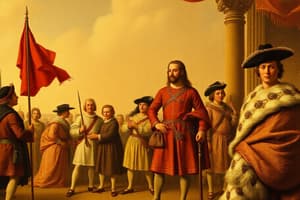Podcast
Questions and Answers
What is a key characteristic of absolutism?
What is a key characteristic of absolutism?
- Centralized power (correct)
- Democracy
- Federalism
- Separation of powers
What was a consequence of the Wars of Religion in Europe?
What was a consequence of the Wars of Religion in Europe?
- Unification of European states
- Rise of democracy
- Strengthening of feudalism
- Weakening of feudalism (correct)
Which of the following was a major achievement of Peter the Great?
Which of the following was a major achievement of Peter the Great?
- Modernization and westernization of Russia (correct)
- Persecution of Enlightenment thinkers
- Establishment of a constitutional monarchy
- Expansion of Russian territory through diplomacy
What was the primary purpose of the Table of Ranks established by Peter the Great?
What was the primary purpose of the Table of Ranks established by Peter the Great?
What was a criticism of absolutism by Enlightenment thinkers?
What was a criticism of absolutism by Enlightenment thinkers?
Which of the following is a consequence of absolutism?
Which of the following is a consequence of absolutism?
What was a major goal of Frederick the Great of Prussia?
What was a major goal of Frederick the Great of Prussia?
What was a characteristic of Louis XIV's reign in France?
What was a characteristic of Louis XIV's reign in France?
What was a key principle of Newton's four-way framework?
What was a key principle of Newton's four-way framework?
What was the significant improvement of Newton's analytical method compared to Aristotle's approach?
What was the significant improvement of Newton's analytical method compared to Aristotle's approach?
What was the main contribution of Newton to Galileo's experimental method?
What was the main contribution of Newton to Galileo's experimental method?
What was the significance of Newton's distinction between 'natural philosophy' and 'physical science'?
What was the significance of Newton's distinction between 'natural philosophy' and 'physical science'?
What was the primary purpose of professional societies for scientists?
What was the primary purpose of professional societies for scientists?
What was the significance of the Royal Society of London?
What was the significance of the Royal Society of London?
Who was the first Curator of Experiments at the Royal Society of London?
Who was the first Curator of Experiments at the Royal Society of London?
What was a key factor that contributed to the emergence of science as a discipline independent from philosophy?
What was a key factor that contributed to the emergence of science as a discipline independent from philosophy?
What was the main outcome of the collaboration among natural philosophers?
What was the main outcome of the collaboration among natural philosophers?
What was the significance of Newton's work in relation to his contemporaries?
What was the significance of Newton's work in relation to his contemporaries?
Flashcards
Absolutism
Absolutism
A system of government where a monarch holds complete control and power.
Divine Right of Kings
Divine Right of Kings
The belief that monarchs are chosen by God to rule.
Louis XIV
Louis XIV
Powerful French monarch (1643-1715).
Peter the Great
Peter the Great
Signup and view all the flashcards
Frederick the Great
Frederick the Great
Signup and view all the flashcards
Centralized Power
Centralized Power
Signup and view all the flashcards
Wars of Religion
Wars of Religion
Signup and view all the flashcards
Rise of Nation-States
Rise of Nation-States
Signup and view all the flashcards
Economic Crises
Economic Crises
Signup and view all the flashcards
Scientific Revolution
Scientific Revolution
Signup and view all the flashcards
Heliocentrism
Heliocentrism
Signup and view all the flashcards
Nicolaus Copernicus
Nicolaus Copernicus
Signup and view all the flashcards
Royal Society
Royal Society
Signup and view all the flashcards
Philosophical Transactions
Philosophical Transactions
Signup and view all the flashcards
Experimental Method
Experimental Method
Signup and view all the flashcards
Enlightenment Thinking
Enlightenment Thinking
Signup and view all the flashcards
Geocentric Model
Geocentric Model
Signup and view all the flashcards
Study Notes
Absolutism in Europe
Definition and Characteristics
Absolutism: a system of government where a monarch holds complete control and power over their territory and people
- Key characteristics:
Centralized power
Divine right of kings (monarchs believed they were appointed by God)
Limited or no representation for citizens
No separation of powers (legislative, executive, judicial)
Often accompanied by a strong bureaucracy
Causes of Absolutism
Wars of Religion (16th-17th centuries): weakened feudalism and led to a desire for strong central authority
Rise of nation-states: monarchs sought to unify and strengthen their territories
Economic crisis: monarchs needed to consolidate power to address financial difficulties
Major Absolutist Monarchs in Europe
- Louis XIV of France (1643-1715)
Established a powerful centralized state
Created a strong bureaucracy and administrative system
Revoked the Edict of Nantes (1685), leading to the persecution of Huguenots
- Peter the Great of Russia (1682-1725)
Modernized and westernized Russia
Created a strong, centralized government
Established the Table of Ranks (1722), a system of nobility based on merit
- Frederick the Great of Prussia (1740-1786)
Expanded Prussian territory through military conquests
Established a strong, efficient bureaucracy
Encouraged Enlightenment thinkers and culture
Consequences of Absolutism
Strengthening of the state: absolutist monarchs created powerful, centralized governments
Limitations on individual freedom: citizens had limited representation and no separation of powers
Wars and conflicts: absolutist monarchs often engaged in wars to expand their territories and consolidate power
Enlightenment and criticism: absolutism sparked criticism from Enlightenment thinkers, who advocated for individual rights and liberties
Absolutism in Europe
Definition and Characteristics
Absolutism is a system of government where a monarch holds complete control and power over their territory and people
- Characteristics of absolutism include:
Centralized power, where the monarch has total authority
Divine right of kings, where monarchs believe they are appointed by God
Limited or no representation for citizens, with no input in government
No separation of powers, where the monarch holds legislative, executive, and judicial power
A strong bureaucracy that carries out the monarch's will
Causes of Absolutism
Wars of Religion (16th-17th centuries) weakened feudalism and led to a desire for strong central authority
The rise of nation-states led monarchs to seek unification and strengthening of their territories
Economic crises drove monarchs to consolidate power to address financial difficulties
Major Absolutist Monarchs in Europe
Louis XIV of France (1643-1715)
Established a powerful centralized state in France
Created a strong bureaucracy and administrative system
Revoked the Edict of Nantes (1685), leading to the persecution of Huguenots
Peter the Great of Russia (1682-1725)
Modernized and westernized Russia
Created a strong, centralized government
Established the Table of Ranks (1722), a system of nobility based on merit
Frederick the Great of Prussia (1740-1786)
Expanded Prussian territory through military conquests
Established a strong, efficient bureaucracy
Encouraged Enlightenment thinkers and culture in Prussia
Consequences of Absolutism
Strengthening of the state: absolutist monarchs created powerful, centralized governments
Limitations on individual freedom: citizens had limited representation and no separation of powers
Wars and conflicts: absolutist monarchs often engaged in wars to expand their territories and consolidate power
Criticism from Enlightenment thinkers: absolutism sparked criticism from thinkers who advocated for individual rights and liberties
The Scientific Revolution
- The Scientific Revolution was a series of events that marked the emergence of modern science during the early modern period.
- Developments in mathematics, physics, astronomy, biology, and chemistry transformed society's views about nature.
- The Scientific Revolution took place in Europe towards the end of the Renaissance period and continued through the late 18th century.
Key Figures and Events
- Nicolaus Copernicus' publication of De revolutionibus orbium coelestium (On the Revolutions of the Heavenly Spheres) in 1543 marked the beginning of the Scientific Revolution.
- Francis Bacon's "confident and emphatic announcement" in the modern progress of science inspired the creation of scientific societies.
- Galileo championed Copernicus and developed the science of motion.
- Isaac Newton's 1687 Principia formulated the laws of motion and universal gravitation, completing the synthesis of a new cosmology.
Scientific Societies
- The Royal Society of London for the Improvement of Natural Knowledge was established in 1660 with Robert Hooke as the first Curator of Experiments.
- The Society's early meetings included experiments performed by Robert Hooke and Denis Papin.
- The Society began publication of Philosophical Transactions from 1665, the oldest and longest-running scientific journal in the world.
- The French established the Academy of Sciences in 1666 as a government body by Jean-Baptiste Colbert.
New Ideas
Astronomy
- The geocentric model of the Earth as the center of the universe was replaced by heliocentrism.
New Mechanical Devices
Calculating Devices
- John Napier introduced logarithms as a powerful mathematical tool.
- Henry Briggs and John Napier developed logarithmic tables that made calculations by hand much quicker.
- John Napier's bones used a set of numbered rods as a multiplication tool using the system of lattice multiplication.
- Edmund Gunter built the first analog device to aid computation, the 'Gunter's scale'.
Factors Contributing to the Scientific Revolution
- Collaboration between scientists and philosophers from different fields.
- Realization of the inadequacy of medieval experimental methods.
- Access to a legacy of European, Greek, and Middle Eastern scientific philosophy.
- The establishment of scientific societies like the Royal Society.
Impact of the Scientific Revolution
- The scientific revolution led to the development of the experimental method used today.
- It represented a step towards Enlightenment thinking with an emphasis on reason.
- The scientific revolution had a significant impact on the scientific method used in science today.
Studying That Suits You
Use AI to generate personalized quizzes and flashcards to suit your learning preferences.




